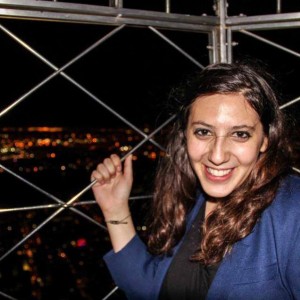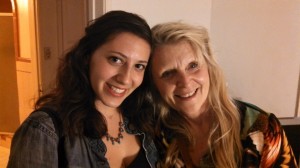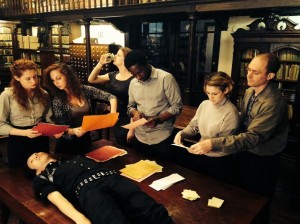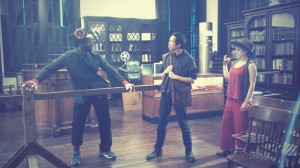
It’s always a little jarring to meet a young person so thoroughly motivated and farsighted as Manon Manavit. Manon relocated to Philadelphia from Montreal a few months ago to work for the Mann Center. At 23, she’s already lived a performing arts dream, traveling the world as an assistant for Cirque Du Soleil, getting to design costumes and give input on shows seen by tens of thousands. In her short time in Philadelphia, she’s introduced herself to writers, performers, and producers across the city, determined to become a part of the city’s performing arts fabric..
And this month, she’s putting on her own adaptation of a Sturm und Drang classic of early 19th century German Romanticism, MICHAEL THE REBEL, fully funded and with a cast of top Philly actors (including Chris Davis and Lesley Berkowitz). Her Humble Treasures ensemble is collaborating with host the German Society of Pennsylvania to stage a short run (June 5-8) complete with puppets and original music. Manavit is amiable, intelligent, and eager to make her mark on Philadelphia theater. You heard it here first: this might be a future star of Philadelphia performing arts. Phindie sat down to ask her a few questions.
Phindie: Welcome to Philly! How have you found it getting started in a new city?
Manon Manavit: I’ve felt very welcome here—the theatre community is collaborative, supportive, and open. Philly is a great city, and I enjoy its rich diversity; demographically, architecturally, culturally. Food. I like the food. I moved here on a gut instinct, and I stand by that decision!

Phinide: Tell us about Humble Treasures.
MM: The name Humble Treasure comes from an essay written by one of my theater ‘papas’ you might say, Maurice Maeterlinck, a Belgian symbolist. (“The Treasure of the Humble”) It’s a sort of a manifesto describing static drama which is a dramatic theory that informs my work as a theater artist. It’s a rather mystical way of telling a story—it gave way to Brecht—in which you are transparent that you are telling a story that has a beginning, middle, and end. The characters are struggling with the external forces that compel them, and they struggle against their own fate. The crucial difference between this view and say, Greek tragedy, is that in a Greek tragedy the audience knows your fate but you “don’t”. Static drama asks “why not actively know your fate the whole time?:
In my work; I use techniques and motifs that reflect this. I often open my plays with a movement prologue (outside of any text) in which all the characters are in the playing space simultaneously, negotiating the space and acting out their unconscious fate and desires, negotiating the relationship between themselves as actors and their taking on of a role; or many roles. I juxtapose vignette-like scenes with abstract choreography. I’ve involved God-like narrators. In MICHAEL THE REBEL, I worked with Richard Chan (playing Michael) to simultaneously know his destiny as a rebel and yet fight against his inevitable execution. It’s meta. It’s trying to do in theater what we do in life: to act in a way that we feel fulfills our “destiny” until we meet our inevitable end. I see it as a sacred gift that in theater (as a story we’ve dutifully rehearsed and come to know well) we know how it ends. I try to use that knowledge as a dramatic device in a search for meaning, planting surprises all along the way, of course.
Phindie: Do you think you’re crafting an ensemble that will continue to work together?
MM: So far I’ve been the only repeating member of Humble Treasure Productions; my first show under that banner being a puppet play based on another German Romantic text; Georg Buchner’s Lenz, which played in Montreal in the back of a vintage clothing boutique/anarchist meeting place. The goal is to have a working ensemble; to find people who enjoy my style and methodology and want to do multiple shows. I think there’s potential for further collaboration within the ensemble I am working with.

Phindie: How did you find your way to Kleist? How long have you been working on the script for Michael the Rebel?
MM: I found the selected works of Heinrich von Kleist in a bin on the streets of Montreal last summer. Never one to walk away from a box of free books, it caught my eye. I’d never heard of Kleist before. It was fate. I read the story Michael Kohlhaas and was hooked. It struck me like an anvil on the head. I knew it would be the basis of my next project. Typically, when this happens to me, I percolate on the story for several months, and do exhaustive research and dramaturgy. Images, related reading, archival material etc. Then when I feel my visioning work is thorough and I can feel the story and see it with my eyes closed; I high-tail it to the library and don’t come out until I have a script. I finished the script for Lenz in six days. Michael the Rebel was written in two.
Phindie: Tell me about directing your own play. Have you done this before? How do you separate playwright mind from director mind?
MM: I don’t identify as a playwright. I don’t write original material. I think of myself as an adapter/ author/ interpreter. This play is the tenth production I’ve directed, and the third in which I’ve written my own adaptation of a text: there was Lenz, which I converted from a novella into a puppet play, and Kafka, a play based on the 19991 Soderbergh film of the same name. I downloaded the screenplay online, printed it out, cut it up, threw it down some stairs, and re-wrote it as a stage play based on the random puzzle-like “chance slices” I had made.
Because I’m following a pre-determined story, the directing work can be judicious. I don’t feel attached at all. I have no qualms cutting or re-working things I wrote based on the actors’ feedback and ideas. My scripts are just that; scripts. Working versions of the play. So much of my work is physical, gestural…They’re not meant to be read as “literature” because they’re intended to be performed.
Phindie: This is quite a hands-on, multimedia production. Puppetry / original score / creating your own props. Is this how you normally handle your work?
MM: Necessity being the mother of invention of course, I’ve always worked on shoestring budgets that require me to be resourceful and creative. My mother is a puppeteer. I grew up knowing that if you want something done, you go to the studio and make it. Michael The Rebel’s budget (thanks to Kickstarter and the Open Society Foundations) allowed me to hire a set designer and costume designer. As for the original score, that’s something that I feel philosophically committed to in my theatre work. Sound is a forgotten sensory experience: it is so much a part of the fabric of our lives and so ubiquitous that it can be easily neglected in theatre. If I want to convincingly create and substantiate a fictional world/alt. reality, original music that fits the tone and theme of the play is a must. I love working with musicians, and learned the basics of scoring live theatre while ADing a multi-media opera about Darwin, in college.

Phindie: How has the German Society space shaped your production?
MM: This production is entirely shaped by the Horner Memorial Library space, a wall-to-wall book collection spanning centuries of German literature. It has so many nooks and crannies that the actors enter and exit from; we’ve designed a pulley system to send messages across the space; the balconies are used to symbolize ‘the royal palace’ whose residents are literally ‘above’ the law, etc. I’d call it site-specific. The meta-ness of the fact that we’re performing a story contained in one of the books there (they have a first edition Kleist from 1810 printed in original printing-press typeface!) is not lost on me. The idea of a book coming to life is a cosmic joke of performing a play in a library.
Phindie: If you weren’t spending all of your time on MICHAEL right now, what production would you be working on? Or would you be on a beach somewhere instead?
MM: Although I love the beach, and would happily go to there- I always have projects on the backburner that I’d love to meet Philly peeps to collaborate on with. I want to write an adaptation of The Fox by D.H. Lawrence (a story of a soldier who turns a lesbian couple against each other) set in DIY/punk culture. I want to do a hard-boiled detective mystery based on City of Glass by Paul Auster, with puppets. I want to do Amiri Baraka’s Dutchman & The Slave (especially in light of his death this year) and I want to do some Balzac vignettes in a subway car…..who knows!
Phindie: Where’s your favorite Philly coffee shop/bar/hotspot/place to unwind? And what in particular do you go there for?
MM: I am often found at Rocket Cat Café in Fishtown spending all day working on my laptop with the others. My roommate and best friend Mariah Welch (a tattoo artist responsible for the show’s graphic design and puppet design) and I go to Atlantis: The Lost Bar to read. Doofy men still hit on us, despite being completely engrossed in books (“What are you reading?” Etc.), but it’s a nice ambiance!
Phindie: Good places. Thanks Manon!
MICHAEL THE REBEL runs June 5-8, 2014, at the German Society of Pennsylvania [611 Spring Garden Street], michaeltherebel.eventbrite.com.
